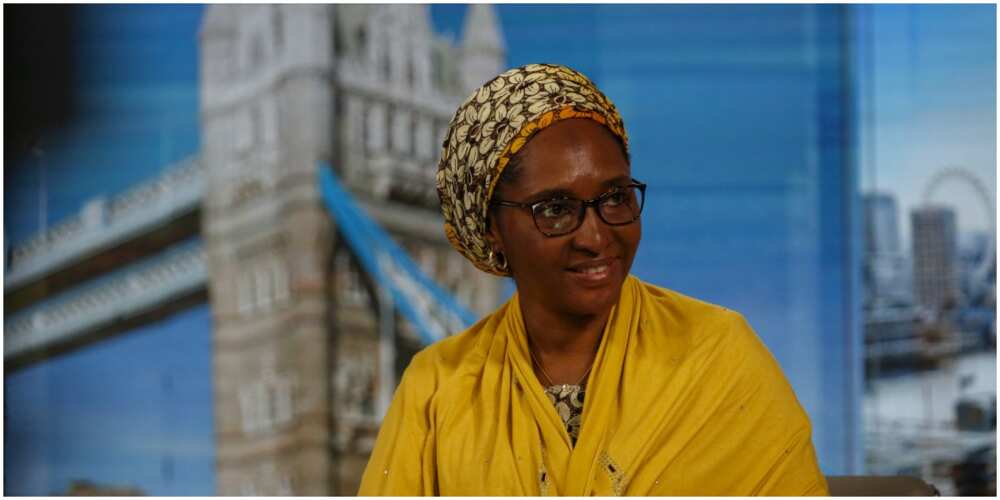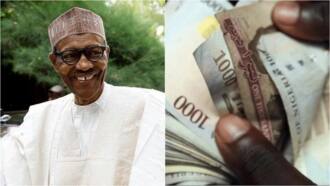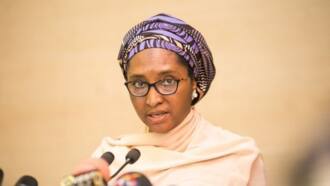Bet9ja Players, SMEs, Others Targeted in Buhari’s New Finance Bill
- Betting companies and their customers will pay taxes to the federal government is the new Finance Bill being proposed becomes law
- Also targeted are Small and Medium Enterprises whose allowance or unabsorbed allowances will be targeted in the new bill
- Foreign organisations or individuals not resident in Nigeria but make money here will also pay tax to the federal government
PAY ATTENTION: Click “See First” under the “Following” tab to see Legit.ng News on your Facebook News Feed!
Apart from betting organisations paying taxes to the federal government, players or bet winners from these platforms will be expected to part with a certain amount as income tax to the government.
Also, video gamers who play to make money will also be taxed under the new bill which is designed to drive massive revenue for the Nigerian government on rush to shore up revenue which includes debt servicing and maintaining the over-bloated civil service and retinue of aides of government officials paid.

Read also
Uber, Bolt in trouble as House of Reps moves to probe ride-hail businesses in Nigeria over tax compliance

Source: Getty Images
If the new Finance bill is passed into law, it will see the Nigerian government embark on an aggressive tax drive as it scrounges for revenue to service debilitating a debt profile.
The proposed new bill will empower tax agency to in Nigeria to spy into the bank account of Nigerians as it will become mandatory for bank account holders to obtain a Tax Identification Number (TIN). It will become compulsory for individuals seeking to open a bank account to obtain a TIN from FIRS
PAY ATTENTION: Subscribe to Digital Talk newsletter to receive must-know business stories and succeed BIG!
The bill has scaled second reading on the floor of the Senate.
The new bill also make small businesses which have unspent funds brought forward to be counted as spent and pay taxes from it.
This means that unless the SMEs a startup, the federal government will target monies left unspent and ask them to pay taxes from the unspent funds.
Two weeks ago, the Federal Executive Council (FEC) approved the country’s amended Finance Bill and sent it to the National Assembly for deliberation and approval. The Bill focused mainly on tax reforms as well as reviewing and amending other 11 fiscal laws.
Compulsory TIN before operating bank accounts
However, the bill has some broad implications for Nigerians on one hand and companies on the other. For instance, the bill requires Nigerians to obtain a Tax Identification Number (TIN) before opening a bank account in a Deposit Money Bank (DMB). The TIN requirement was only for corporate entities but now individuals will be required to get one before operating a bank account.
Tax, Tax and more Tax
The bill was silent on Value Added Tax (VAT) which is still a subject of litigation between the Federal government and some state governments.
Minister of Finance, Zainab Ahmed while explaining the bill said rather than proposing new taxes or increasing tax rates, the Bill focuses more on closing loopholes and improving tax administration in the country.
What Zainab said:
“This draft bill was prepared by the Fiscal Policy Committee and it is focused on tax and reviewing some fiscal laws and also amending some and these laws, about 11 in number, that have been affected,” she said adding “the purpose for us is to be able to refine our fiscal laws to improve tax compliance and also to enhance revenue generation.”
The finance minister said the proposed legislation falls under five categories.
The first is domestic revenue mobilization and various measures in the bill to enhance revenue. They include exemptions of the case from shares disposals from capital gains tax to long term equity investments, out to a close in tax loopholes for companies that are transmitted from the previous federal public tax regime to the world corporate tax and have recovered tax regime that is provided under the new petrol industry act of 2021.

Read also
Subsidy removal and 3 Other tough economic decisions by FG that will impact you heavily in 2022
There are also provisions that have been made to prevent the abuse of Personal Income Tax released by individual taxpayers and allowances to evade taxation.
Ahmed also said the bill would empower the Federal Inland Revenue Service (FIRS) to collect Companies income tax from profits made by foreign digital companies like Facebook and Twitter with a huge presence in the country.
According to the Finance Minister:
“This second broad category is tax administration reforms and includes provisions to support the FIRS ongoing reforms to fully automate and deploy technology to enhance collections and encourage taxpayer compliance, and there are several measures in that category.”
Another amendment in the Bill is on international taxation reforms. The provision empowers the FIRS to better assess non-resident companies to taxation by taxing profits derived from digital services rendered to Nigerian customers. It is also designed to reduce the tax compliance burdens on non-resident taxpayers that are not required to register in Nigeria as companies.

Read also
Facebook tells Nigerians to prepare for a 7.5% hike In Value Added Tax beginning January 1, 2022
One broad objective of the Finance Bill is reform in the finance sector aimed at enhancing tax equity.
The provisions here are made specifically to enhance ongoing capital market reforms relating to securities lending transactions, real estate investment trusts, as well as the minimum taxation reductions that have been pioneered by the two previous Finance Bills.
Another specific area of the new Finance Bill is critical public financial management and reform.
The reform was designed to strengthen the FIRS tax administration and coordination role in relation to the collection of taxes, vis-a-vis the responsibilities of relevant law enforcement agencies, such as the Nigerian Police or the Economic and Financial Crimes Commission and also to ensure and reinforce the supremacy of the fiscal rules and regulations as provided for by the Finance Controls and Management Act, as well as the 1999 Constitution.
Bet players will pay taxes
The Lottery and Gaming business is to be specifically taxable under CITA including betting, the game of chance, promotional competition, betting, wagering, video gamers, roulette, craps, bingo, slot or gaming machines and the likes.

Read also
FG gives Pantami, NCC N1.8bn to monitor and block SIM cards used for dubious calls and frauds
Also, entities engaged in petroleum operations including midstream and downstream operations will not be eligible for exemption on profits in respect of goods exported from Nigeria while downstream companies were previously eligible under the old Upstream and Downstream classification.
The FIRS to be empowered to assess CIT on the turnover of a foreign digital company involved in transmitting, emitting, or receiving signals, sounds, messages, images or data of any kind including e-commerce, app stores, and online adverts.
Capital allowance that can be claimed on an asset will be limited to the portion used for generating taxable profits while assets partially used to generate taxable income will be eligible for pro-rata capital allowance except where the proportion of non-taxable income does not exceed 20 per cent of the total income of the company.
SMEs also targeted
Any capital allowance or unabsorbed allowances brought forward by a small or medium company, other than a company under pioneer status, to be treated as having been claimed and consumed in each such year of assessment.
The reduction of the minimum tax rate from 0.5 per cent to 0.25 per of turnover (the less franked investment income) is to be applicable to any two accounting periods between 1 Jan 2019 and 31 Dec 2021 as may be chosen by the taxpayer.
Disputed tax assessment to be put forward until determination while undisputed tax assessment is to be paid within 30 days after service of the notice of assessment on the company except otherwise extended by the FIRS. Reference to provisional tax has been deleted in recognition of the well-established self-assessment tax regime.
Withholding tax on interest earned from a unit trust is to be treated as final tax. Only WHT on dividends is currently treated as a final tax for local companies.
The deployment of technology to automate tax administration including assessment and information gathering by FIRS to now include third party technology (previously only proprietary technology may be deployed). A penalty of N50,000 to be applicable where a company fails to grant access to FIRS in addition to N25,000 for each day the failure continues.
The tax agency is to be the primary agency of the Federal Government responsible for the administration, assessment, collection, accounting and enforcement of taxes and levies due to the Federation, the Federal Government and any of its agencies except otherwise authorized by the Finance Minister.
Legit.ng reports that the minister of finance, Mrs Zainab Ahmed has said there might be an introduction of new tariffs and levies in 2022, stressing that the Nigerian economy was now on a recovery path.
The Guardian newspaper reports that Ahmed made this known while addressing stakeholders at a public hearing on the 2021 Finance Bill organised by the House of Representatives committee on finance on Monday, December 13 in Abuja.
She said that a couple of reforms and amendments had been recommended in the draft 2021 Finance amendment bill, adding that more will be introduced in the middle of 2022.

Read also
Debt management office justifies president Muhammadu Buhari continuous borrowing as debt hit N35.5 trillion
Source: Legit.ng




